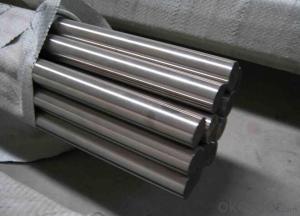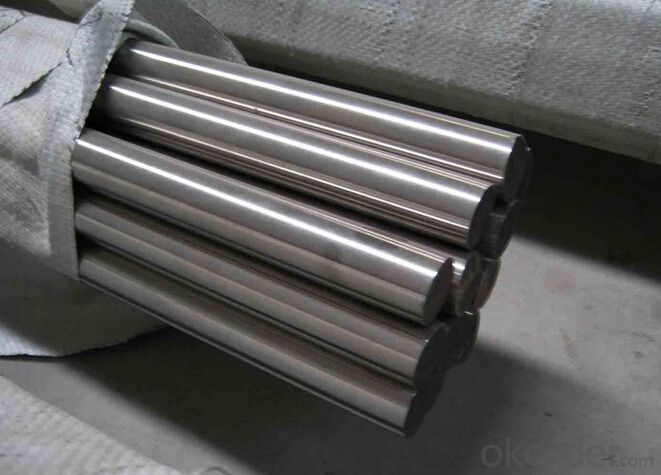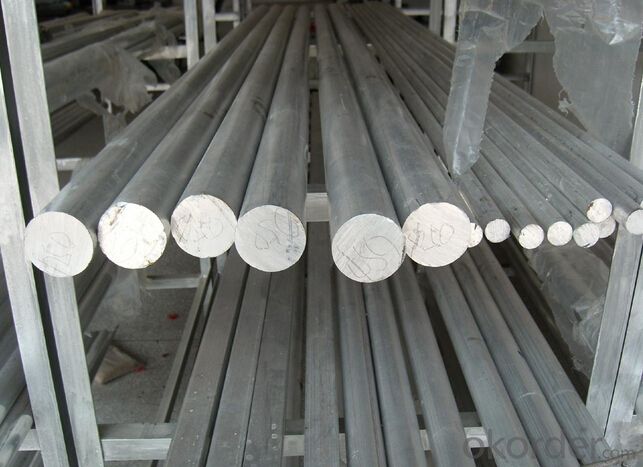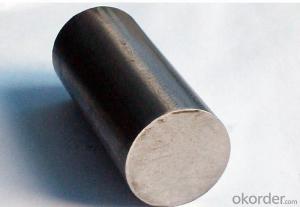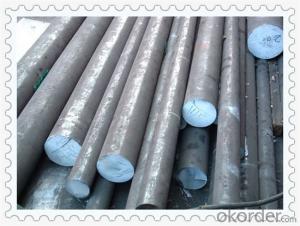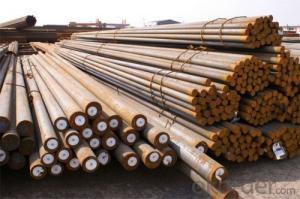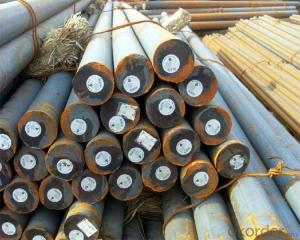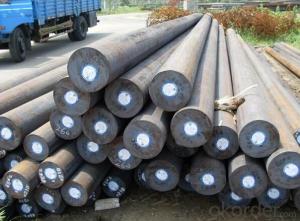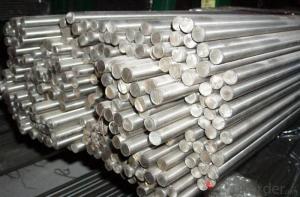Special Steel Aisi 4130 Alloy Steel Material Steel Round Bar
- Loading Port:
- China main port
- Payment Terms:
- TT or LC
- Min Order Qty:
- 25 m.t.
- Supply Capability:
- 10000 m.t./month
OKorder Service Pledge
OKorder Financial Service
You Might Also Like
Specification
The details of our Steel
1. Produce Standard: as the GB, AISI, ASTM, SAE, EN, BS, DIN, JIS Industry Standard
2. Produce processes: Smelt Iron -EAF smelt Billet - ESR smelt Billet -Hot rolled or forged get the steel round bar and plate
3. Heat treatment:
Normalized / Annealed / Quenched+Tempered
4. Quality assurance:
All order we can received Third party inspection, You can let SGS, BV,.. and others test company test and inspect our products before Goods shipping.
Product information
1.Specification of aisi 4130 alloy steel | |||||||||||||
Round bar | Diameter(mm) | Length (mm) | |||||||||||
10~300 | 2000~5800 | ||||||||||||
Plate | Thickness(mm) | Width (mm) | Length (mm) | ||||||||||
20~70 | 105~610 | 2000~5800 | |||||||||||
The specification can be customised! | |||||||||||||
2.Chemical compositon of aisi 4130 alloy steel | |||||||||||||
NO. | C | Mn | Si | Cr | Mo | Ni | P | S | |||||
Aisi 4130 | 0.38~0.43 | 0.60~0.80 | 0.15~0.35 | 0.70~0.90 | 0.20~0.30 | 1.65~2.00 | ≤0.035 | ≤0.040 | |||||
3. Mechanical properties of aisi 4130 alloy steel | |||||||||||||
Tensile str. (N/mm2) | Yield point (N/mm2) | Elongation (%) | Hardness | ||||||||||
980 | 835 | 12 | 269 | ||||||||||
4.Heat treatment of aisi 4130 alloy steel | |||||||||||||
1. Forging:Heat slowly and uniformly to 1000°C. After forging cool slowly. | |||||||||||||
2. Annealing: 780-800`C slow cooling | |||||||||||||
5.Characteristic of aisi 4130 alloy steel | |||||||||||||
(1)Good purity and homogeneity. | |||||||||||||
(2) Good machinability (Roughing, grinding and drilling). | |||||||||||||
(3) Good dimensional stability during heat treatment. | |||||||||||||
(4) Excellent preparation for nitriding, both ionic and gaseous, induction hardening to increase the mechanical properties. | |||||||||||||
6.Application of aisi 4130 alloy steel | |||||||||||||
(1)It is widely used in high-strength forgings, such as traction gear, supercharger drive gear, rear axle, the load of connecting rod, spring clip; | |||||||||||||
(2)It also manufactured tool joints and finish tools which used for oil wells below 2000m deep. | |||||||||||||
(3)For making welding parts; board;welding structure;high pressure pipe in the chemical industry. | |||||||||||||
(4)For making temperature under 450°C‘s fastener in the steam turbine, boiler manufacturing. | |||||||||||||
(5)For making under the 500°C and the high pressure's flange and nut. | |||||||||||||
(6)especially used to produce the conduit pipe which is under 400°C and the barometric pressure is 300. | |||||||||||||
Main product
High speed steel | |
AISI | M2,M4,M35,M42,T1 |
DIN | 1.3343,1.3243,1.3247,1.3355 |
JIS | SKH51,SKH54,SKH35,SKH59,SKH2 |
Cold work tool steel | |
AISI | D2,D5,D3,D6,A8,A2,O1 |
DIN | 1.2379,1.2601,1.2080,1.2436,1.2631,1.2363,1.2510,1.2327 |
JIS | SKD10,SKD11,SKD1,SKS3 |
Hot work tool steel | |
AISI | H13,H11,H21 |
DIN | 1.2344,1.2343,1.2367,1.2581,1.2713 |
JIS | SKD61,SKD6,SKD7,SKD5SKT4 |
Plastic mould steel | |
AISI | P20,P20+Ni,420 |
DIN | 1.2311,1.2738,1.2083,1.2316 |
JIS | PDS-3,SUS420J1,SUS420J2 |
Alloy structural seel | |
AISI | 5140,4340,4135,4140 |
DIN | 1.7035,1.6511,1.7220,1.7225 |
JIS | SCr440,SNCM439,SCM435,SCM440 |
Stainless steel | |
AISI | 440C,420,430 |
DIN | 1.4125 |
JIS | SUS440C |
Carbon steel | |
AISI | 1045,1020 |
DIN | 1.1191 |
JIS | S45C, G3101 |
Product show

Workshop show

Shipping
1. FedEx/DHL/UPS/TNT for samples, Door-to-Door;
2. By Air or by Sea for batch goods, for FCL; Airport/ Port receiving;
3. Customers specifying freight forwarders or negotiable shipping methods!
Delivery Time: 3-7 days for samples; 5-25 days for batch goods.
Payment Terms
1.Payment: T/T, L/C, Western Union, MoneyGram,PayPal; 30% deposits; 70% balance before delivery.
2.MOQ: 1pcs
3.Warranty : 3 years
4.Package Informations: 1) EXPORT, In 20 feet (GW 25 ton) or 40 feet Container (GW 25 ton)
2)as customer's requirement
Why choose us?
(1) The leading exporter in China special steel industry.
(2) Large stocks for various sizes, fast delivery date.
(3) Good business relationship with China famous factories.
(4) More than 7 years steel exporting experience.
(5) Good after-sales service guarantee.
- Q: How does cryogenic treatment affect the toughness of special steel?
- Cryogenic treatment has a significant impact on the toughness of special steel. It involves subjecting the steel to extremely low temperatures, typically below -150 degrees Celsius, for an extended period. This process transforms the microstructure of the steel, resulting in improved mechanical properties, including increased toughness. During cryogenic treatment, the steel undergoes a process called martensitic transformation, where the carbon atoms in the steel lattice rearrange themselves. This transformation leads to the formation of additional carbides, which are responsible for strengthening the steel and increasing its toughness. These carbides act as barriers, impeding the propagation of cracks and enhancing the resistance of the steel to fracture. Furthermore, cryogenic treatment also reduces the presence of retained austenite, a metastable phase in steel that can negatively impact its mechanical properties. The transformation of retained austenite into martensite during cryogenic treatment further improves the toughness of the steel. The increased toughness of cryogenically treated special steel makes it suitable for various applications that require high strength and resistance to fracture. It enhances the steel's ability to withstand heavy loads, impacts, and harsh environments. Additionally, cryogenic treatment can improve the wear resistance and dimensional stability of special steel. It is important to note that while cryogenic treatment can significantly enhance the toughness of special steel, it is not a standalone solution. Other factors, such as the initial composition and heat treatment of the steel, also play a crucial role in determining its overall mechanical properties. Therefore, cryogenic treatment should be considered as a complementary process to optimize the toughness of special steel.
- Q: What are the different heat treatment techniques used for special steel?
- Some of the different heat treatment techniques used for special steel include annealing, tempering, quenching, and case hardening. Annealing is a process that involves heating the steel to a specific temperature and then slowly cooling it to relieve stress and improve its ductility. Tempering is done by reheating the steel to a lower temperature after quenching to reduce brittleness and increase toughness. Quenching is a rapid cooling process that involves immersing the steel in a quenching medium like oil or water to achieve high hardness. Case hardening is a technique that involves adding a hard outer layer to the steel by introducing carbon or nitrogen into its surface and then heat treating it to achieve desired properties. These techniques are used to modify the structure and properties of special steel to meet specific application requirements.
- Q: Can special steel be used in the mining equipment manufacturing industry?
- Yes, special steel can be used in the mining equipment manufacturing industry. Special steel, such as wear-resistant steel, high-strength steel, or corrosion-resistant steel, is often used in the manufacturing of mining equipment due to its durability, toughness, and resistance to harsh conditions commonly encountered in mining operations. Special steel can enhance the performance and lifespan of mining equipment, making it a suitable choice for this industry.
- Q: Can special steel be used for making surgical instruments?
- Yes, special steel can be used for making surgical instruments. Special steel, also known as surgical steel or medical-grade steel, is specifically designed to meet the high standards required for medical and surgical applications. It is highly resistant to corrosion, has excellent strength and durability, and can withstand repeated sterilization processes without losing its properties. Surgical instruments made from special steel are known for their precision, reliability, and ability to maintain a sharp cutting edge. These instruments are essential in various surgical procedures, including but not limited to, cutting, dissecting, manipulating, and suturing tissues. The use of special steel ensures that surgical instruments are safe, hygienic, and suitable for use in medical environments.
- Q: What are the requirements for special steel used in high-pressure applications?
- Special steel used in high-pressure applications must meet certain requirements in order to ensure its durability and reliability under extreme conditions. Some of the key requirements for this type of steel include: 1. High strength: Special steel for high-pressure applications needs to have exceptional strength to withstand the intense forces and pressures it will be subjected to. This allows it to resist deformation and maintain its structural integrity. 2. Excellent corrosion resistance: The steel must have a high resistance to corrosion, as it will often come into contact with aggressive fluids or gases in high-pressure environments. This prevents the steel from deteriorating over time and helps to maintain its performance and longevity. 3. Good weldability: Special steel used in high-pressure applications should possess good weldability to enable easy and efficient joining of different components. This ensures the overall integrity and reliability of the system. 4. High temperature resistance: The steel must have the ability to withstand elevated temperatures without losing its mechanical properties. This is particularly important in applications where high-pressure fluids or gases are heated or where the steel is exposed to extreme heat sources. 5. Fatigue resistance: Special steel should have a high resistance to fatigue failure, as it will often be subjected to cyclic loading and pressure fluctuations. This allows the steel to withstand repeated stress and pressure cycles without developing cracks or failures. 6. Tight dimensional tolerance: The steel should have tight dimensional tolerance to ensure proper fit and functionality within the high-pressure system. This helps to minimize leakage or any potential weak points in the system. 7. Compliance with industry standards: Special steel used in high-pressure applications should meet relevant industry standards and specifications, such as those set by organizations like the American Society of Mechanical Engineers (ASME) or the American Petroleum Institute (API). This ensures that the steel meets the required quality and performance standards. Overall, special steel for high-pressure applications needs to possess a combination of high strength, excellent corrosion resistance, good weldability, high temperature resistance, fatigue resistance, tight dimensional tolerance, and compliance with industry standards to ensure its suitability and reliability in demanding environments.
- Q: How is special steel used in the chemical industry?
- Special steel is widely used in the chemical industry due to its excellent corrosion resistance properties. It is used to manufacture various equipment and components like storage tanks, pipes, valves, and reactors that come in contact with corrosive chemicals. Additionally, special steel's high strength and temperature resistance make it suitable for applications requiring robust and durable materials in chemical processing plants.
- Q: What are the different types of nitriding steel?
- There are mainly two types of nitriding steel: gas nitriding steel and plasma nitriding steel.
- Q: How does special steel contribute to the automotive noise reduction?
- Special steel contributes to automotive noise reduction in several ways. Firstly, it is used in the manufacturing of the vehicle's structure and body, providing high strength and stiffness, which helps reduce vibrations and noise transmission. Additionally, special steel can be used in the production of engine components, such as exhaust systems, mufflers, and catalytic converters, which help dampen and absorb noise generated by the engine. Furthermore, the use of special steel in the construction of suspension systems and other mechanical components can also contribute to minimizing noise and vibrations, resulting in a quieter and more comfortable driving experience.
- Q: What are the requirements for special steel used in battery technology?
- To ensure optimal performance and safety, special steel utilized in battery technology must fulfill several requirements. First and foremost, it is imperative that the steel exhibits high corrosion resistance. This is crucial due to the presence of corrosive electrolytes within batteries that can gradually deteriorate the steel. Special steel must possess exceptional resistance to corrosion in order to prevent any chemical reactions that may compromise the battery's integrity and lifespan. Additionally, the steel must possess good mechanical strength to withstand the internal pressures and external forces that batteries encounter during operation and handling. It should be capable of resisting deformation and maintaining its structural integrity, even under high-stress conditions. Furthermore, it is desirable for the special steel to have high thermal conductivity. This is essential for efficient heat dissipation, as overheating can diminish battery performance and potentially lead to safety hazards. Steel with excellent thermal conductivity facilitates effective heat transfer, ensuring that the battery can function within safe temperature limits. Moreover, the steel should exhibit low electrical resistivity to minimize energy losses resulting from electrical resistance. This guarantees efficient energy transfer within the battery and reduces power dissipation, ultimately enhancing overall battery efficiency. In addition, compatibility with other battery materials, such as electrodes, electrolytes, and separators, is crucial. Ensuring compatibility prevents any chemical reactions or detrimental interactions that may jeopardize the battery's performance or lifespan. Finally, in line with the growing emphasis on environmental sustainability, it is increasingly important for special steel used in batteries to be produced using environmentally friendly methods. This entails minimizing the carbon footprint and reducing the consumption of scarce resources. To summarize, special steel utilized in battery technology must possess high corrosion resistance, mechanical strength, thermal conductivity, low electrical resistivity, compatibility with other battery materials, and environmental sustainability. These attributes are necessary to ensure optimal performance and safety in batteries.
- Q: Can special steel be used for medical implants?
- Yes, special steel can be used for medical implants.
Send your message to us
Special Steel Aisi 4130 Alloy Steel Material Steel Round Bar
- Loading Port:
- China main port
- Payment Terms:
- TT or LC
- Min Order Qty:
- 25 m.t.
- Supply Capability:
- 10000 m.t./month
OKorder Service Pledge
OKorder Financial Service
Similar products
Hot products
Hot Searches
Related keywords
